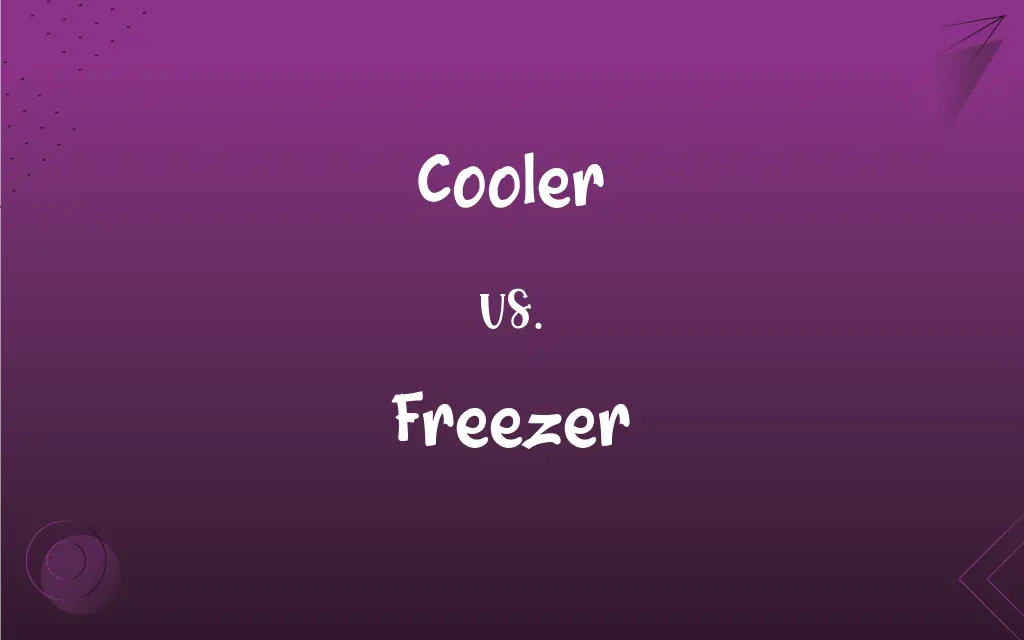Cooler vs. Freezer: What's the Difference?
Edited by Aimie Carlson || By Harlon Moss || Updated on November 7, 2023
A cooler keeps items cold using insulation, while a freezer maintains subzero temperatures to store items for longer.

Key Differences
A cooler is a container designed to keep food and drinks cold for several hours to a few days. It typically uses ice or ice substitutes to maintain a low temperature. The primary function of a cooler is to slow down the spoilage of perishable items during short periods, such as picnics or road trips. A freezer, on the other hand, is an appliance that keeps food frozen at temperatures well below freezing point, usually at 0°F (-18°C) or lower.
Coolers are portable and can be easily moved from place to place. They come in various sizes, from small handheld models to large chests. Freezers are generally stationary, designed to store food for extended periods, and are essential appliances in most homes and commercial establishments. Coolers do not have a mechanism to generate cold but rely on external ice, while freezers are equipped with refrigeration systems that actively cool and maintain their internal temperature.
The insulation in a cooler is key to its effectiveness, as it helps to keep the interior cold despite external temperatures. Freezers, in contrast, not only have insulation but also compressors and refrigerants that cycle continuously to remove heat from the interior space. While a cooler may keep ice from melting for a few days at most, a freezer can keep items frozen indefinitely, given that it remains powered and properly maintained.
When considering their uses, coolers are ideal for temporary food storage during outdoor activities or when away from home. Freezers are used for long-term food preservation, allowing for bulk purchases and advanced meal preparation. The decision to use a cooler or a freezer depends on the duration and purpose of the food storage needed.
Ultimately, the choice between a cooler and a freezer comes down to the specific requirements of the user. A cooler is more about convenience and portability for short-term cooling needs, whereas a freezer is about the long-term storage and preservation of perishable goods. Both serve the purpose of keeping food safe, but they operate under different conditions and are suited to different situations.
ADVERTISEMENT
Comparison Chart
Temperature Range
Above 0°C (32°F), usually up to 10°C (50°F).
Below 0°C (32°F), usually around -18°C (0°F) or lower.
Function
Temporary cooling using ice or ice packs.
Long-term storage with freezing capabilities.
Portability
Portable and designed for travel.
Stationary and designed for long-term use.
Power Source
Does not require electricity to maintain coolness.
Requires electricity to operate the refrigeration system.
Use Cases
Picnics, camping, short trips.
Home and commercial storage of perishables.
ADVERTISEMENT
Insulation
Insulated to retain cool air.
Insulated and equipped with a cooling unit.
Duration of Effectiveness
Several hours to a few days.
Indefinitely, as long as powered.
Cooler and Freezer Definitions
Cooler
A portable container for keeping food and drinks cold.
Pack the sandwiches in the cooler for the beach trip.
Freezer
A compartment of a refrigerator used for freezing food.
Put the ice cream in the freezer so it doesn't melt.
Cooler
A device or apparatus for cooling, especially a receptacle for cooling liquids.
Fill the wine cooler with ice to chill the bottle.
Freezer
An appliance for keeping food frozen.
We stored the bulk meat purchase in the chest freezer.
Cooler
Something that reduces heat or excitement.
The breeze from the ocean was a welcome cooler after the hot day.
Freezer
A device for freezing substances or maintaining them in a frozen state.
The lab's samples are stored in a heavy-duty freezer.
Cooler
A prison or jail.
The suspect was thrown into the cooler overnight.
Freezer
A cold place or situation.
The unheated cabin felt like a freezer in the winter.
Cooler
An informal term for a cool place.
The shade under the tree was a perfect cooler on that sunny afternoon.
Freezer
A unit that produces ice or frost.
The walk-in freezer at the restaurant can hold up to a ton of food.
Cooler
A device, container, or room that cools or keeps cool.
Freezer
A thermally insulated compartment, cabinet, or room in which a subfreezing temperature is maintained for the rapid freezing and storing of perishable items, especially food.
Cooler
A cold drink, usually carbonated, fruit-flavored, and containing wine or other alcoholic ingredients. Also called wine cooler.
Freezer
An appliance or room used to store food or other perishable items at temperatures below 0° Celsius (32° Fahrenheit).
Cooler
(Slang) A jail.
Freezer
The section of a refrigerator used to store food or other perishable items at a temperature below 0° Celsius (32° Fahrenheit).
Freezer
A Parkinson's disease patient that experiences freezing of gait (FOG) episodes.
Freezer
One who, or that which, cools or freezes, as a refrigerator, or the tub and can used in the process of freezing ice cream.
Freezer
Electric refrigerator (trade name Deepfreeze) in which food is frozen and stored for long periods of time
FAQs
How long will a cooler keep things cold?
Typically for a few hours up to several days, depending on insulation quality.
What sizes do coolers come in?
From small personal sizes to large, multi-person sizes.
What is the primary use of a cooler?
To keep items cold temporarily without electricity.
Can you plug in a cooler?
Some electric coolers can be plugged in, but traditional ones cannot.
Can freezers be portable?
Smaller units can be, but they're not as portable as coolers.
Are coolers effective for long-term food storage?
No, they're intended for short-term use.
What types of freezers are there?
Upright, chest, and drawer-style freezers are common.
How cold does a freezer get?
They maintain temperatures around -18°C (0°F) or lower.
Do freezers prevent food spoilage?
They significantly slow it down by keeping food at freezing points.
Is it safe to run a freezer empty?
It's not energy-efficient, but it's not unsafe.
What is a freezer primarily used for?
For long-term storage of food at freezing temperatures.
How do you clean a cooler?
With soap and water, and sometimes bleach for deep cleaning.
Is a cooler the same as an insulated bag?
They serve similar purposes, but coolers are usually more durable.
What shouldn't you store in a freezer?
Items with high water content that don't freeze well, like some fresh produce.
Do freezers need electricity?
Yes, to run the compressor and refrigerant cycle.
Can a cooler operate in a hot car?
Yes, but it will be less effective than in cooler environments.
Can you put ice cream in a cooler?
Temporarily, but it may melt without freezer temperatures.
Can a cooler be used as a freezer?
No, it cannot maintain the low temperatures required to freeze food.
Are there freezer-safe containers?
Yes, containers designed to withstand low temperatures and prevent freezer burn.
Can you transport a freezer?
Yes, but it requires planning and proper handling to avoid damage.
About Author
Written by
Harlon MossHarlon is a seasoned quality moderator and accomplished content writer for Difference Wiki. An alumnus of the prestigious University of California, he earned his degree in Computer Science. Leveraging his academic background, Harlon brings a meticulous and informed perspective to his work, ensuring content accuracy and excellence.
Edited by
Aimie CarlsonAimie Carlson, holding a master's degree in English literature, is a fervent English language enthusiast. She lends her writing talents to Difference Wiki, a prominent website that specializes in comparisons, offering readers insightful analyses that both captivate and inform.































































